
Thank You Email After Interview: 6 Sample Notes for All Jobs
Learn how to write a thank you email after a job interview. See a sample interview thank you email you can copy and use. Get actionable examples and tips!

How to write a resume for medical school admission? What sections to include? Find out here and see the perfect medical school resume examples.
Do you know what a great doctor and making a perfect medical school resume need?
A lot of patience.
So, think of your medical school resume as your first patient and—
Give it the right treatment.
This guide will show you:
Want to save time and have your resume ready in 5 minutes? Try our resume builder. It’s fast and easy to use. Plus, you’ll get ready-made content to add with one click. See 20+ resume templates and create your resume here.
Sample resume made with our builder—See more resume examples here.
Interested in resume writing guides for medical and healthcare professions? We’ve got you covered:
Looking for a different kind of resume writing assistance?
1
A medical school resume differs from a resume for a job in several significant ways.
First of all:
It’s an academic document.
As such it has a lot in common with an academic CV.
Second:
It’s not supposed to get you a job but a place at an academic institution.
Plus:
It’s neither the first nor the only document the admissions committee members will see.
And most importantly, it may not even be required as part of your application.
But if you’re planning on preparing a medical school resume—
Make sure it’s done right.
Here’s a list of sections you may want to consider including in your medical school resume template:
Obviously—
It doesn’t mean your medical school resume must include each and every section listed above.
The most important rule of resume writing can be encapsulated with a single word:
Relevance.
It follows that your medical school resume should only consist of sections that apply to you, and are relevant to the situation.
That said, your medical school resume should always include your contact details, educational background, and experience sections.
Everything else depends on you.
Pro tip: No matter what sections you decide to include in your resume, make sure each of them is ordered reverse-chronologically. This way your latest experience and education comes first.
Having mixed feelings about what resume format to choose? Read our guide: Resume Format: Samples and Templates for all Types of Resumes
Now—
Let’s examine each section to see what kind of information you might want to include.
This section of your resume for medical school is pretty much self-explanatory.
List your:
The final two points are optional. But your LinkedIn profile may give the admissions officer some insight into the things you weren’t able to include on your resume.
Pro Tip: Make sure your email address looks professional. Avoid infantile usernames—it’s best to stick to your first and last name.
Double-check your online presence. Clean up your social media profiles from the things you wouldn’t like others to see. Here’s our guide you may find interesting: How to Check Your Online Presence Before Recruiters Look You Up
You’re applying for a place at a medical school—
So the education section of your medical school resume requires special care and attention.
The university name, dates, and location are hardly enough.
You need to go a little deeper, and list:
Pro Tip: This should be the first section of your medical school resume. There’s no need to put your professional objective up top as your resume is only a part of your medical school application. And your objective is clear: to become a student.
Here’s an example of the education section of a medical school resume:
2018
Stony Brook University, New York, NY
Bachelor of Science, Biochemistry Honors
GPA: 3.95
Thesis title: The role of synthesis and assembly of DNA-defining complexes in Nephrotic Syndrome patients.
Relevant coursework:
Awards and honors:
Scores:
Pro Tip: Leave out your high school education. There’s no need to go so far back in time.
Want to learn more about what to put on display in your medical school education section? We’ve got you covered: Education Resume Section: How to Do It Right (20+ Examples for Any Situation)
Use this section of your medical school resume to show off your professional, clinical, or research experience.
It will give the admissions committee members further insight into the skills you’ve developed.
If you’re having problems with filling in this section with content, don’t leave it empty.
Use it to present your:
Now—
Don’t just list everything you’ve ever done in your entire life. Here’s how to nail your experience section:
Here’s an example of what your medical school resume experience section could look like:
Undergraduate Researcher
Bolton Lab, New York, NY
2016–2018
Chemistry teacher
Stuyvesant High School, New York, NY
2014–2015
Key achievement:
How is this sort of experience relevant to your future career as a doctor?
An experience section like the one above concentrates on your transferable skills, such as critical thinking, collaboration, or leadership.
Not to mention your research experience is bound to get you extra points.
Academic research is part and parcel of being a medical school student.
Don’t know how to describe professional experience on your medical school resume? Read our article: Work Experience on a Resume: Job Description Bullet Points Samples
Here’s the thing—
A dedicated skills section is optional.
But should you choose to have it on your medical school resume, make sure it's done right.
Just remember:
Relevance is king.
In the case of a medical school resume, it’s best to bring your transferable skills in the limelight.
Here’s a list you can use:
It's best to focus on your transferable skills. To achieve maximum impact, select the ones your experience and education sections testify to.
Pro Tip: Consider merging your skills and interests sections into one. This way you’ll save some space.
Not sure what skills to put on your medical school resume? Head straight to our guide: 99 Key Skills for a Resume (Best List of Examples for All Types of Jobs)
When making a resume in our builder, drag & drop bullet points, skills, and auto-fill the boring stuff. Spell check? Check. Start building a professional resume template here for free.
When you’re done, Zety’s resume builder will score your resume and tell you exactly how to make it better.
The willingness to help another person can get you far.
Both on your resume and in real life.
Engaged students are more than welcome in the bustling med student community.
Have a look at an example of what this section could look like on your medical school resume.
Stony Brook Volunteer Ambulance Corps
Stony Brook Medical Center
Need more detailed information on how to make the most of a volunteering section on your medical school resume? Here's a guide for you: How to Add Volunteer Work To Your Resume [+Sample]
You can either create a subsection in the education section to accommodate your academic awards and achievements or make a full-fledged, dedicated section.
The latter option is preferable if the awards and honors you want to present don’t have much to do with your educational background.
In fact, we have a dedicated guide that shows you exactly how to put all kinds of achievements on your resume. Check this out: Achievements to Put on a Resume—Complete Guide (30+ Examples)
Just like in the case of the previous section, you can show your professional and academic affiliations in two ways.
In a subsection under the education heading, or in a separate section.
Each way has its pros and cons.
If you put all the information into the education section, you can rest assured nothing will be left out. On the other hand, the section itself may become too long and hard to navigate.
A dedicated section makes everything look much clearer and allows you to list all sorts of organizations you're a member of, not just the academic ones. The problem is it might end up somewhere at the bottom of your medical school resume.
The choice you make should depend on the length of the education section on your resume.
Have you published any papers or articles?
Don’t let them go unnoticed, and create a dedicated section.
Choose your bibliography format out of the three most popular MLA, APA or Chicago, and use it consistently.
Mind you—
If the medical school you’re applying to offers any guidelines as to the preferred bibliography format, stick to it.
Medical schools value engaged students, willing to make a difference.
Create a separate section on your pre-medical school resume to show you’re an active member of the student community.
Here’s an example to give you some inspiration:
It might be a good idea to prepare a separate section to show off your leadership experience.
This is especially important if you’re applying to one of the most prestigious schools.
Your Harvard medical school resume needs to show your leadership skills are strong enough.
Here’s a couple of ideas to get you inspired:
If you happen to have completed extra courses, earned licenses and certifications relevant to your future career, put them in a separate section on your medical school resume:
Here’s an example:
Looking for information on what other sections your medical school resume would benefit from? Here’s a guide you may find interesting: Resume Sections & Item Order [Extra: Additional Categories that Matter]
2
Before you decide on the best format for your medical school resume, double-check the school’s website to see if there are any guidelines you should stick to.
The guidelines may contain information on the preferred length of the resume or specify the sections you’re supposed to include.
Remember: such guidelines come before anything else.
If you can’t find anything, here’s a list of points to consider when formatting your medical school resume:
Not sure how long your medical school resume should be? Take a look at our guide to find out: How Long Should a Resume Be? Ideal Resume Length.
Plus, a great cover letter that matches your resume will give you an advantage over other candidates. You can write it in our cover letter builder here. Here's what it may look like:
See more cover letter templates and start writing.
Your medical school resume is more than a list of everything you’ve done in your life.
This is how to make your medical school resume stand out from the crowd:
Are you writing a medical school resume for the first time? Or perhaps you’re a medical student who'd like to share their experience? We’d love to hear from you, leave your comment below!
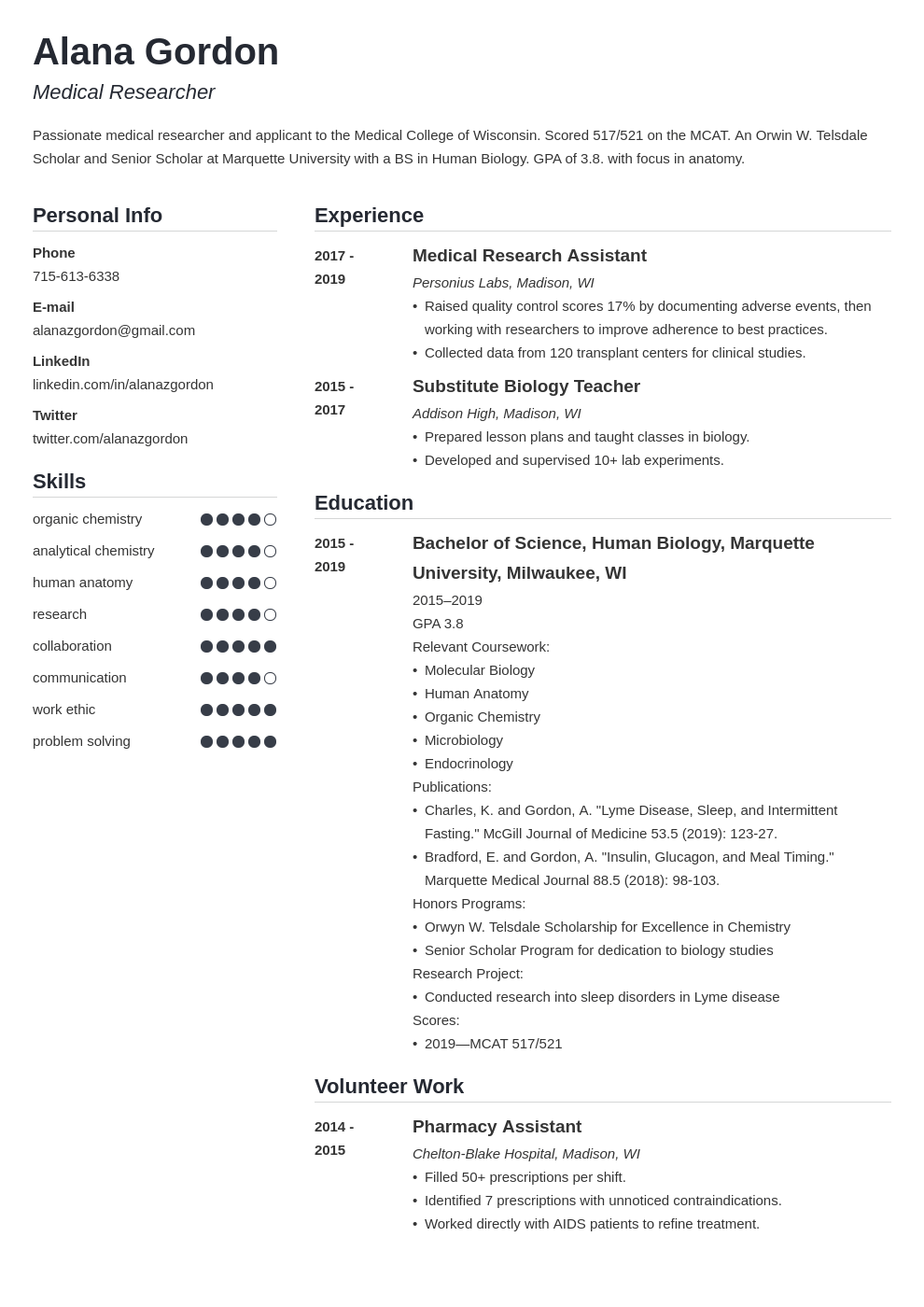
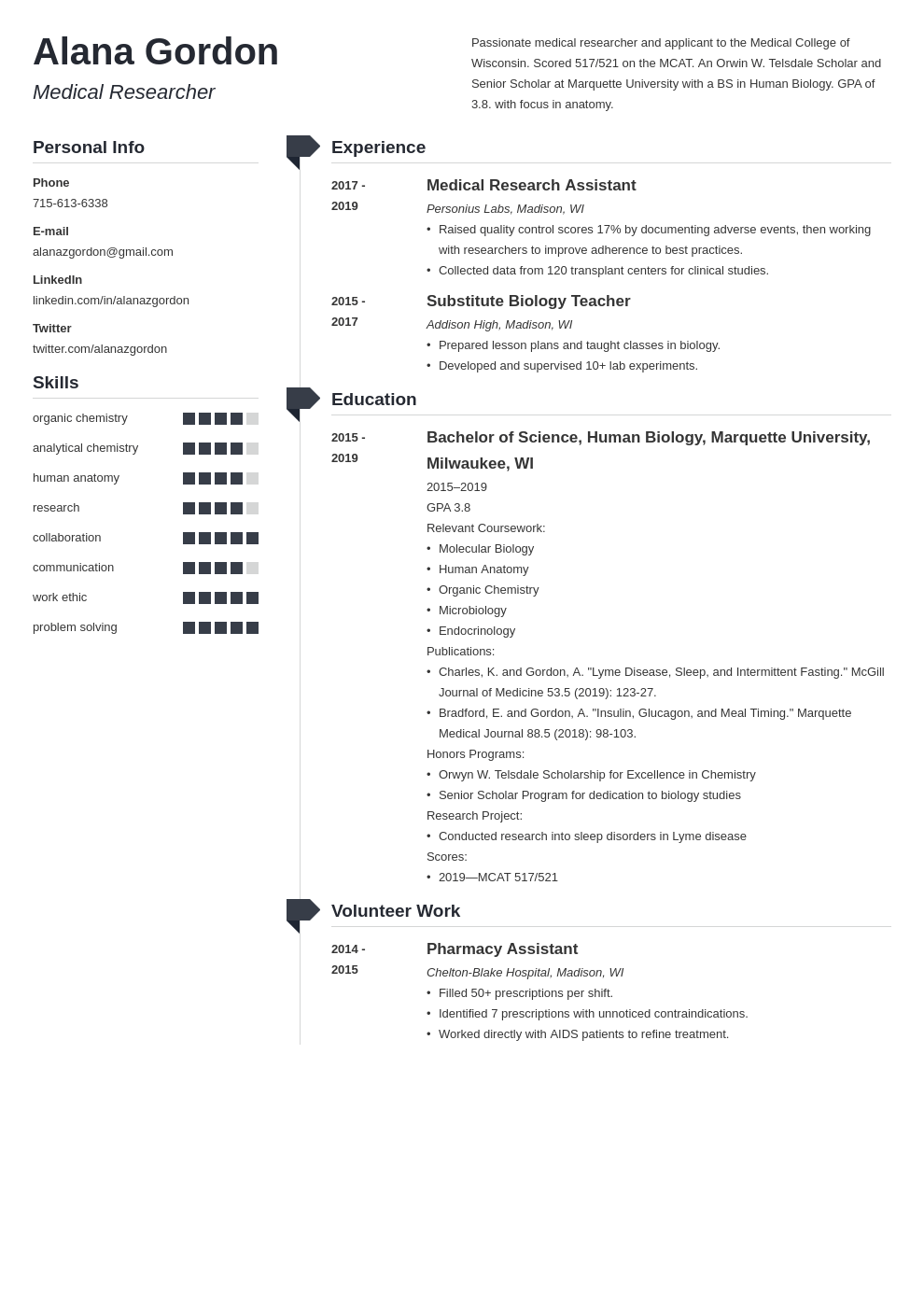

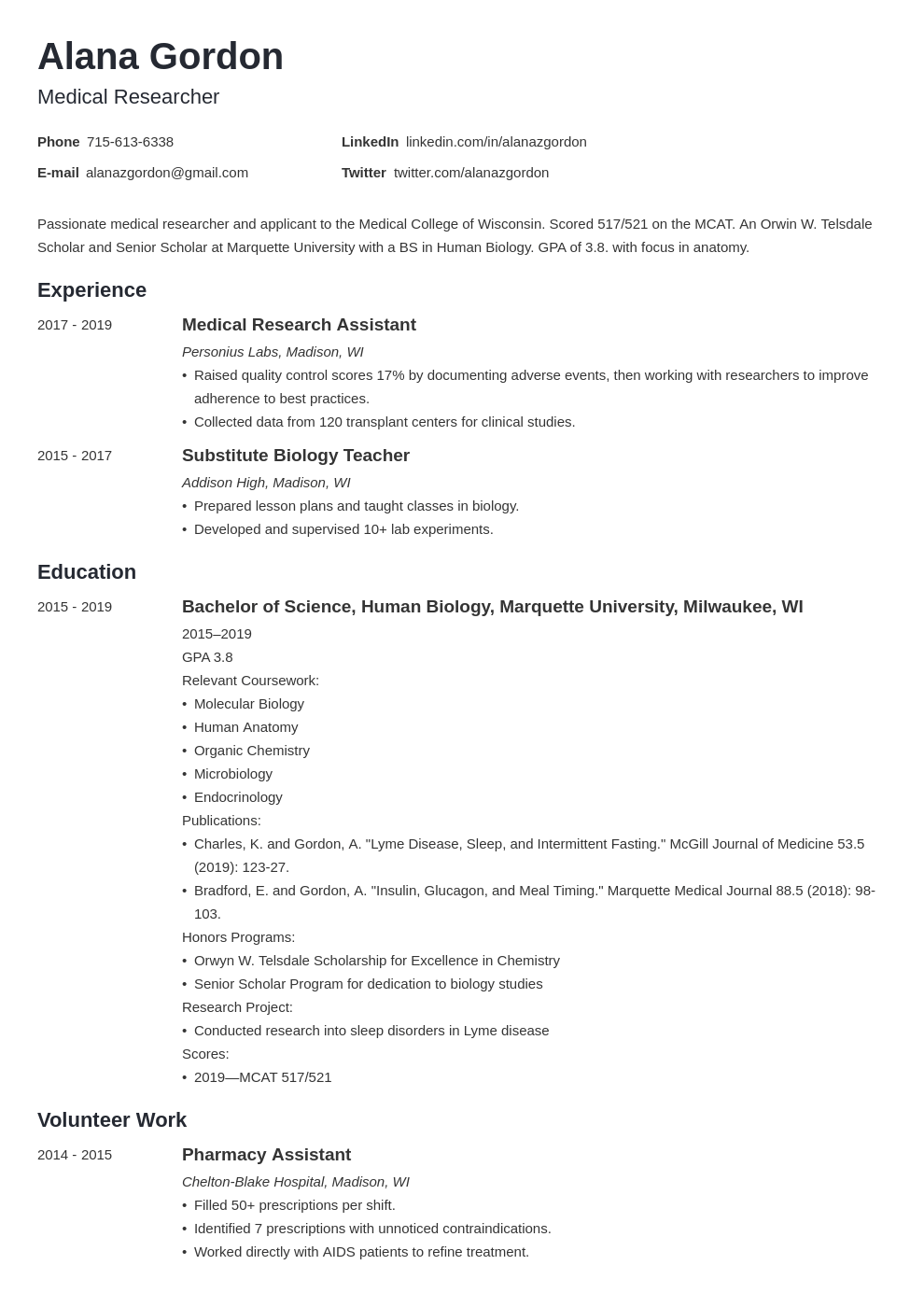
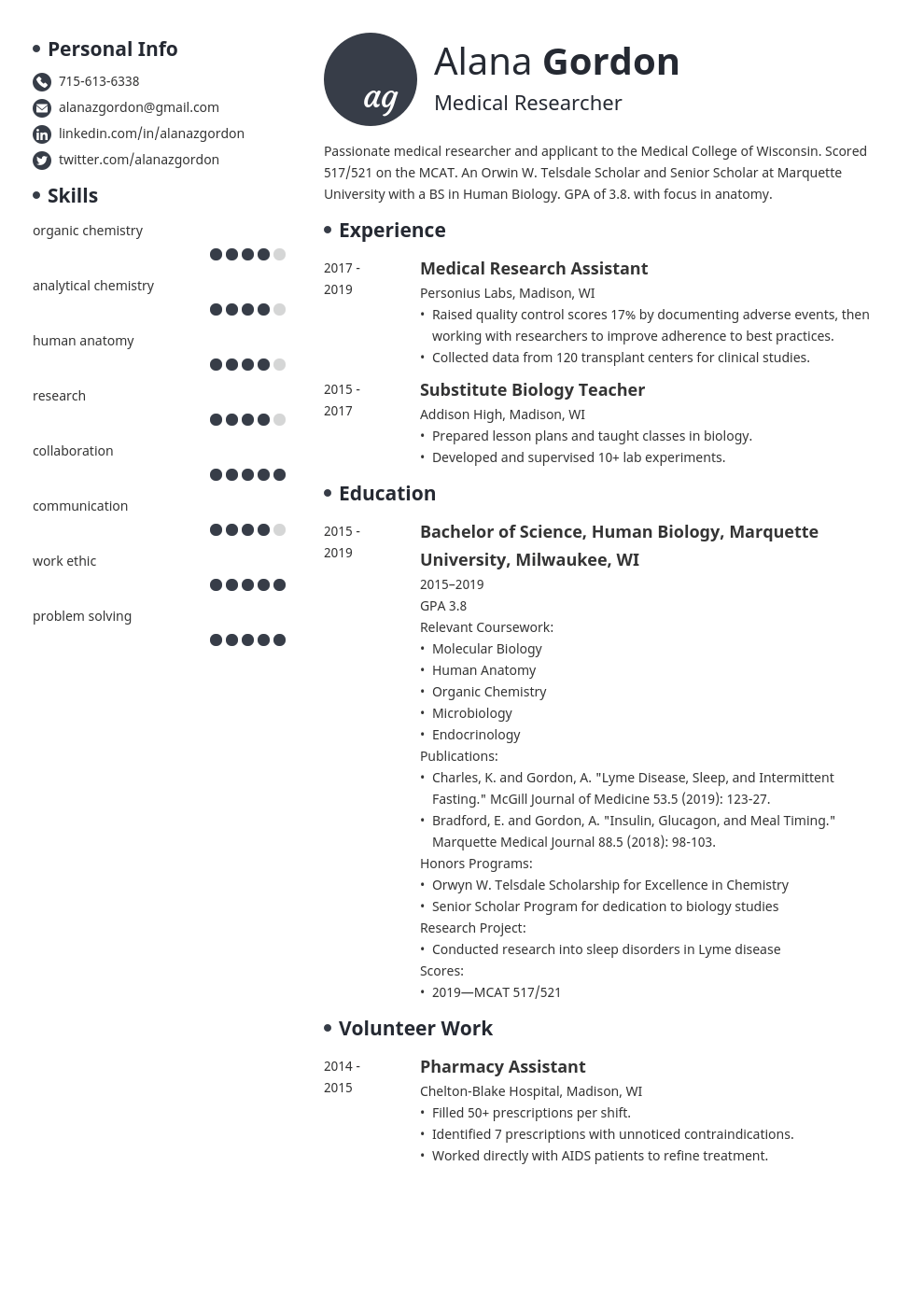

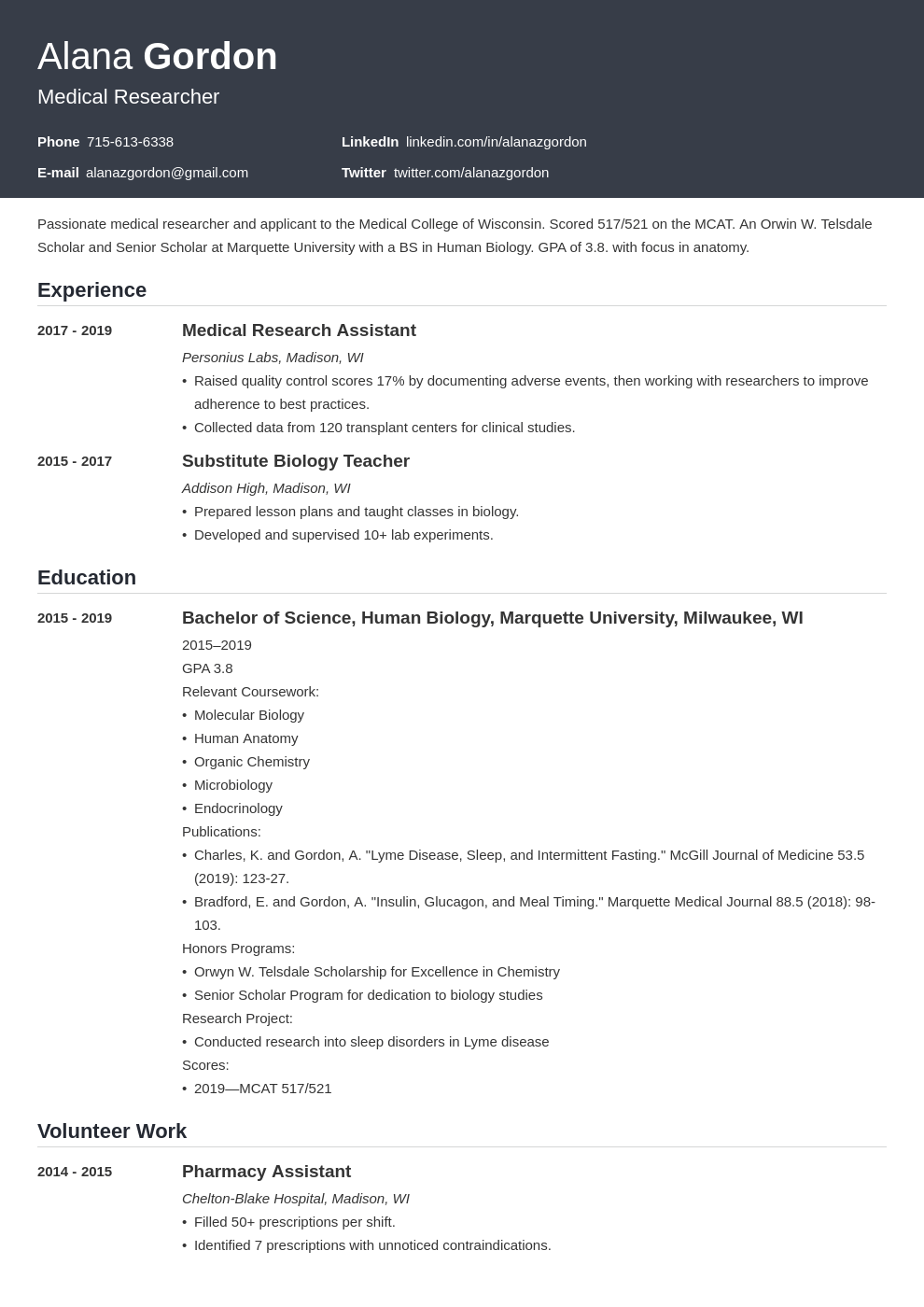
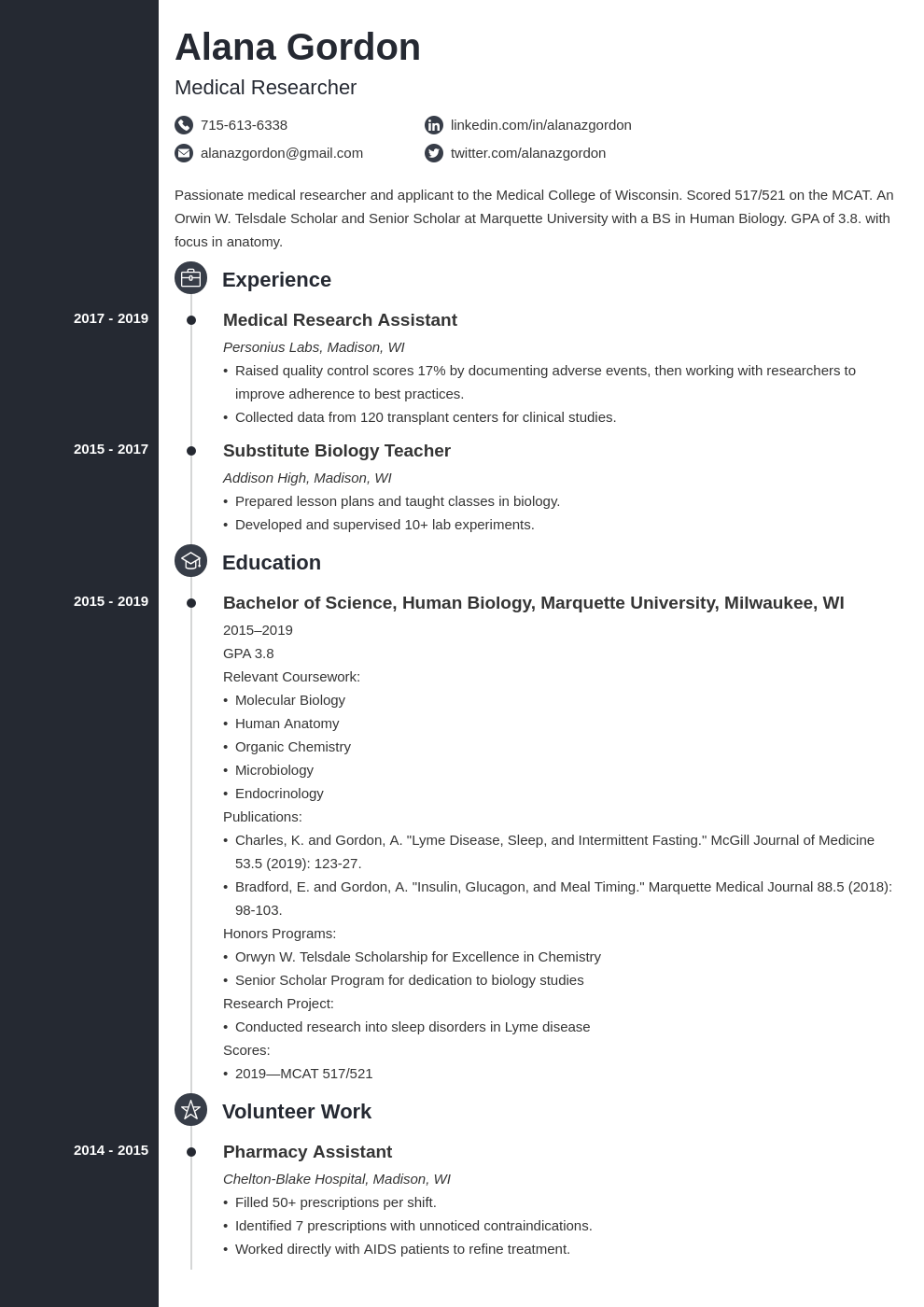
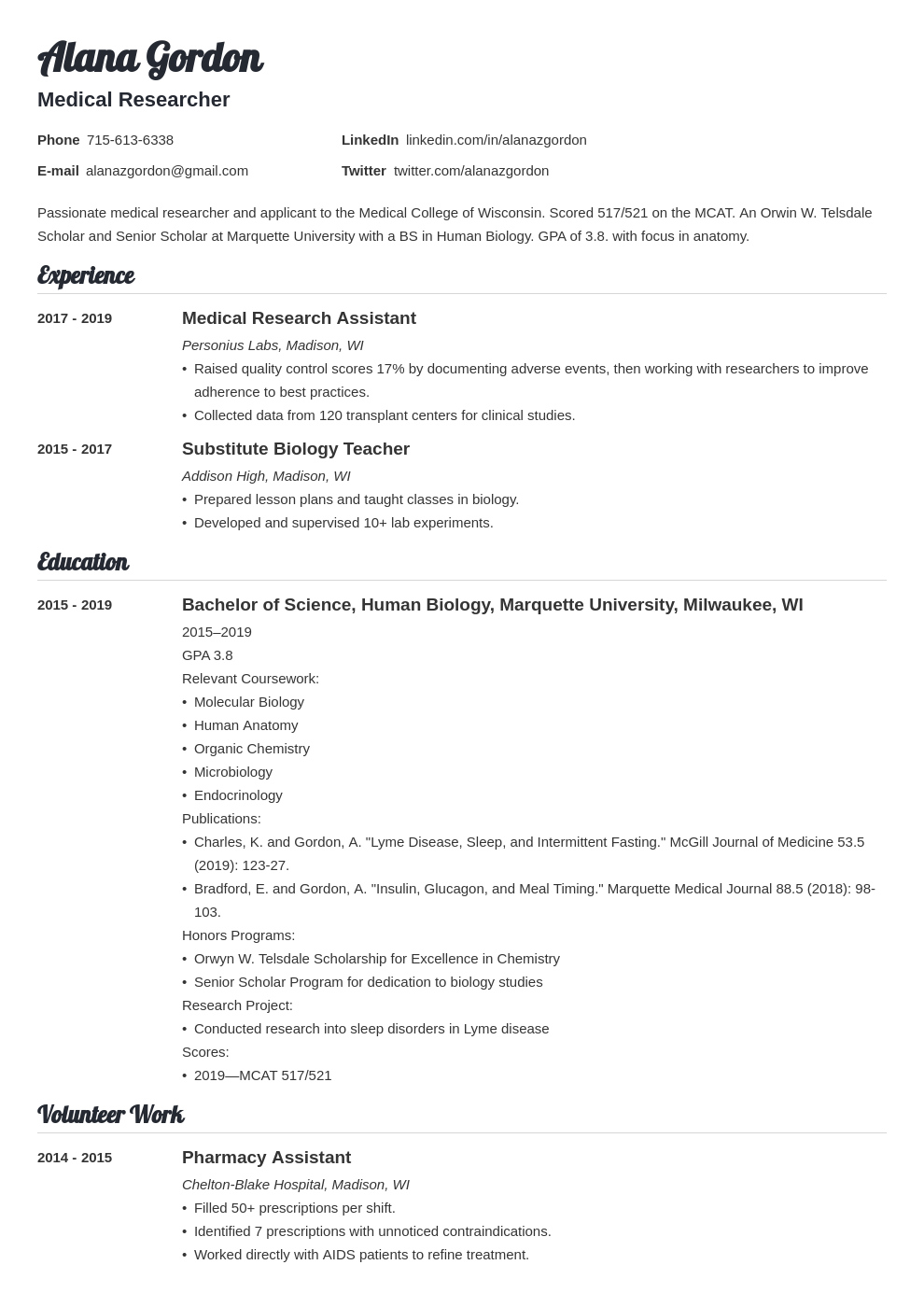

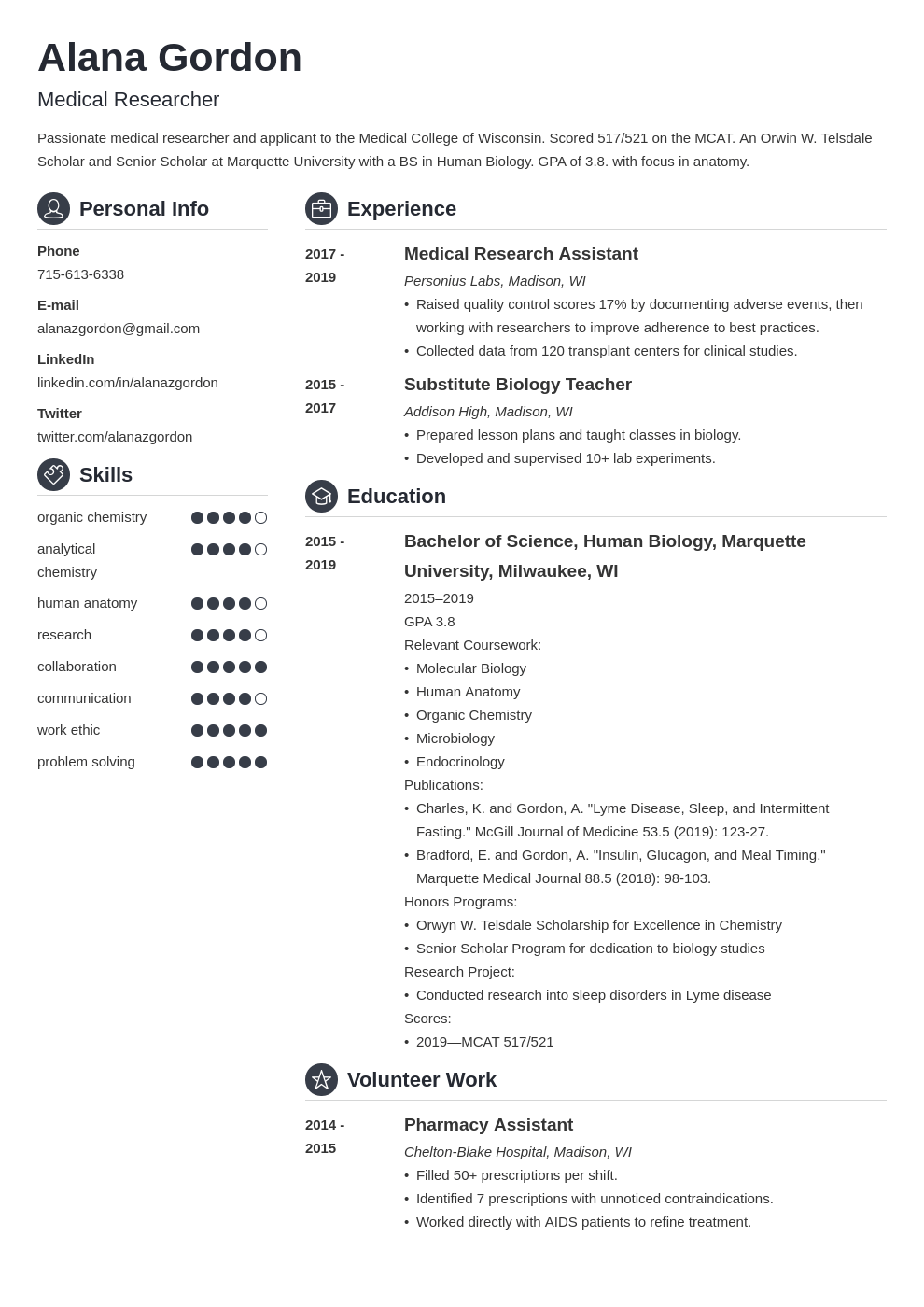
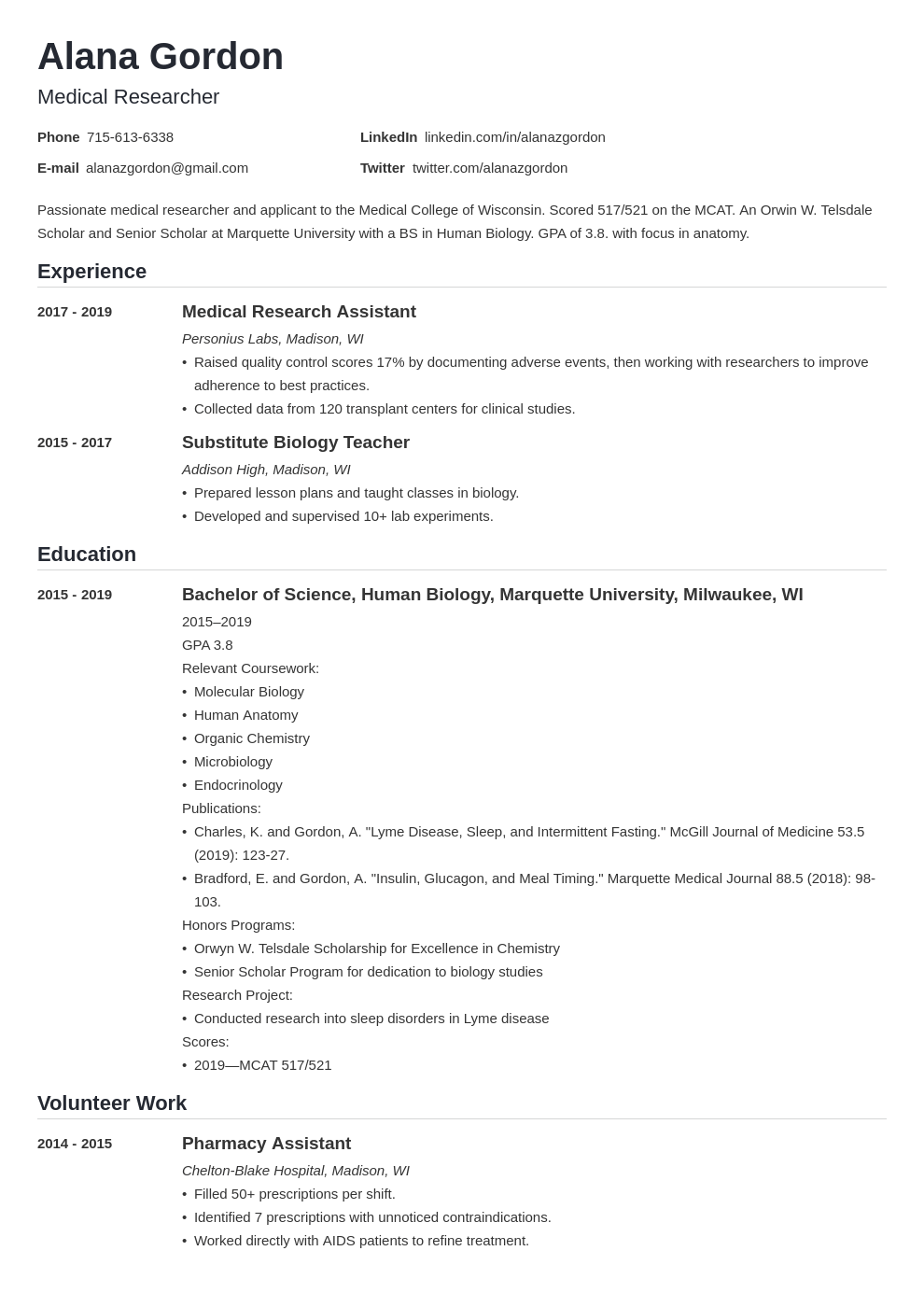

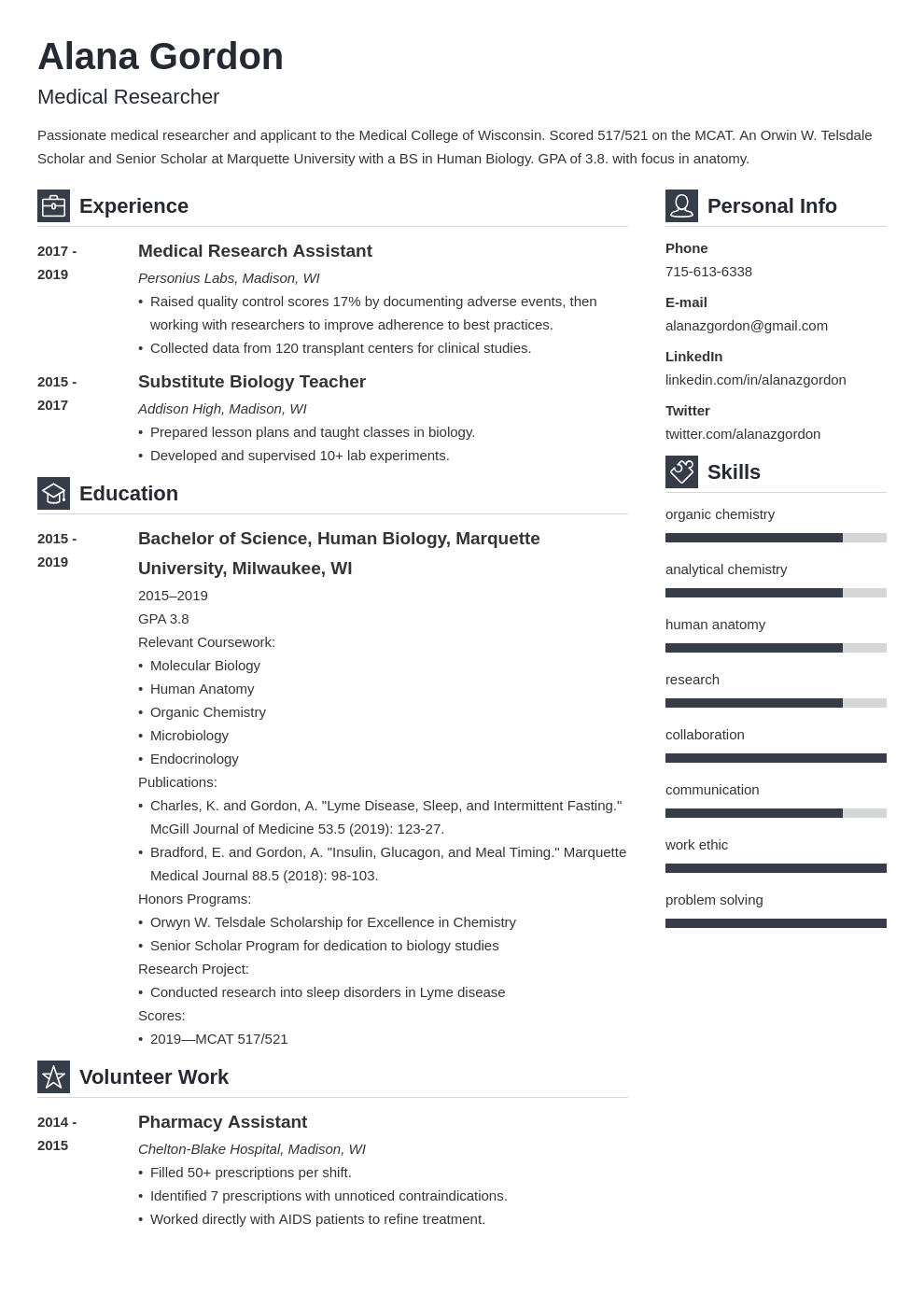
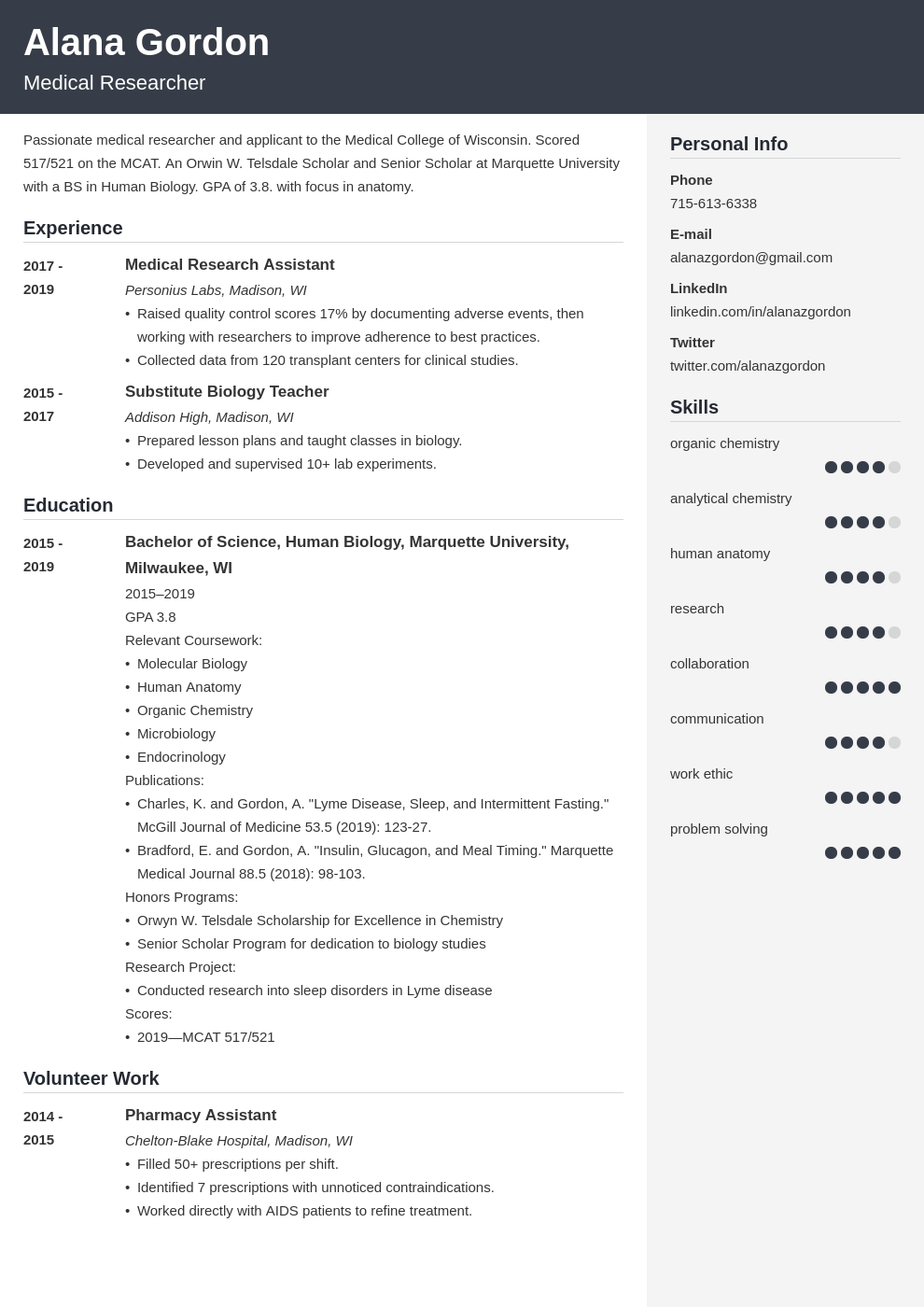
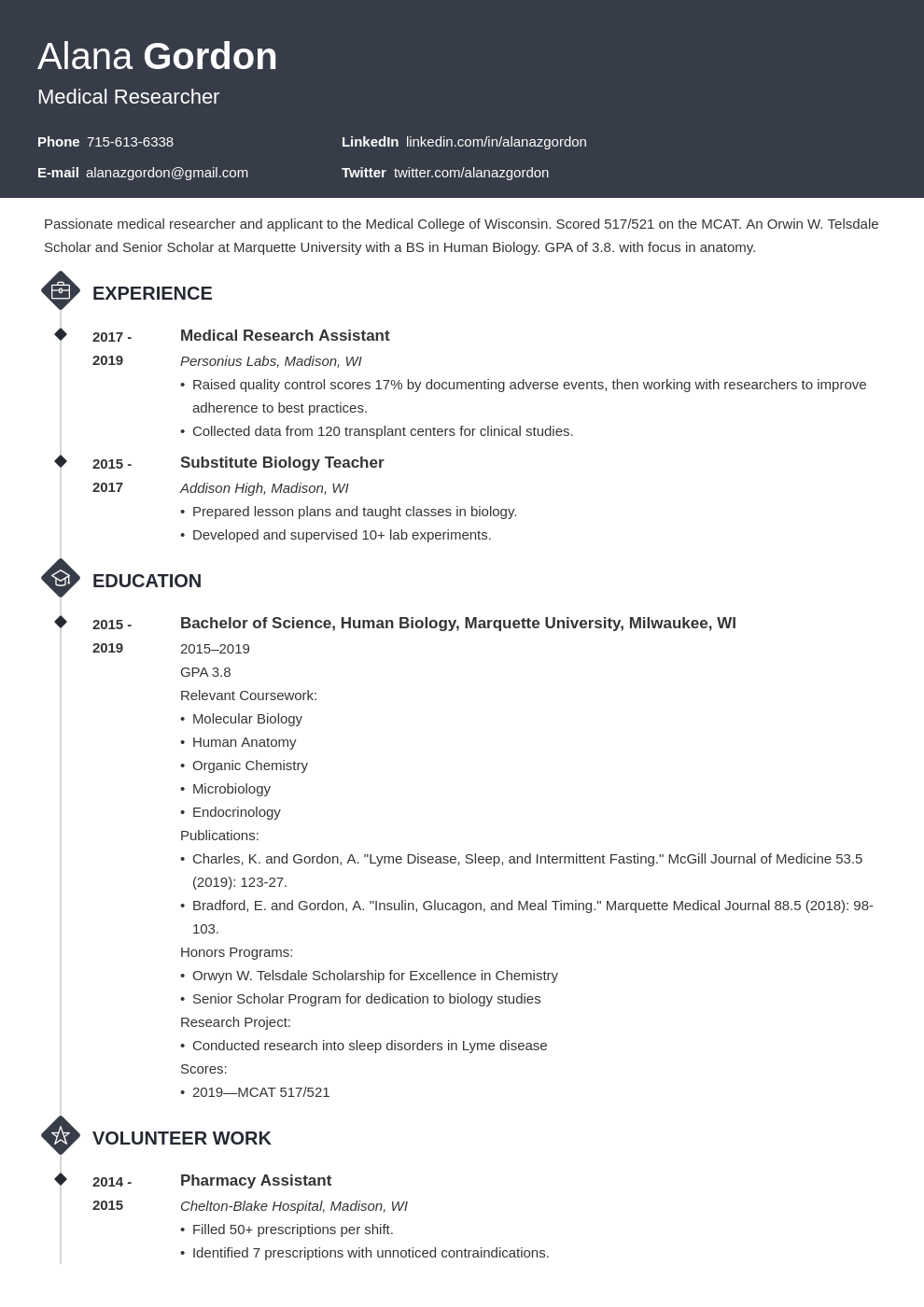
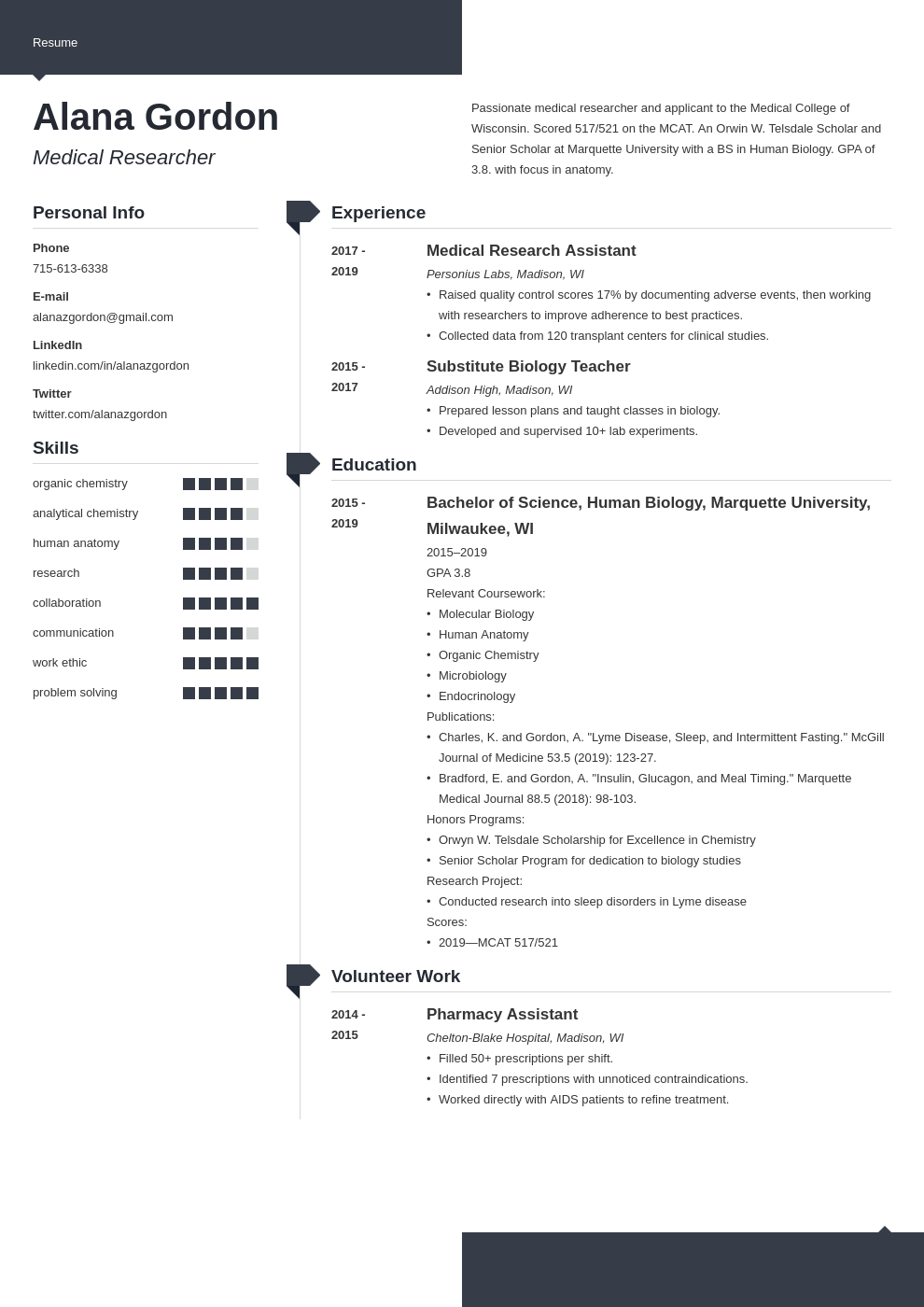
Learn how to write a thank you email after a job interview. See a sample interview thank you email you can copy and use. Get actionable examples and tips!
What is the best font for a resume? Which resume fonts to avoid? Serif or sans? What about bolding, italicizing, resume font size, and section heading titles? In this article, we take a look at over a dozen professional fonts so that you can choose the best font to use for your resume and cover letter.
Find out what sections, achievements, and keywords to include on a CV to land more jobs. Learn what *not* to include so that you don’t sabotage your chances.

